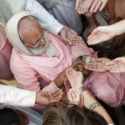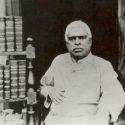The Speciality of Sriman Mahaprabhu’s Dance at Ratha-yatra
- Details

Mahaprabhu moved with such speed, that He appeared to be simultaneously present at every point of His circumambulation. Such a sight is certainly astonishing, but our amazement should not stop there. What bhava was manifesting in Sriman Mahaprabhu at a given moment, and what internal transformations was He undergoing as a result? This was the foundation of His dance...
The Bumblebee
- Details

Radharani is speaking to a bumblebee, who is buzzing about and trying to sit on Her lotus feet, thinking them to be a lotus flower. She tells the bumblebee to go back to Madhupuri (Mathura), from where it has come, for it looks very intoxicated and impure. But the bee does not leave, and Radharani responds by saying, "You are a bumblebee with six legs. Man has two legs and animals have four legs. Animals are foolish...
Venu-Gita - The Flute Song
- Details

I request you to come with me to Vrindavana. The Gopis are assembled in their houses. By their bhava-netra, eyes of transcendental ecstatic emotions, they are seeing that Krishna is going through the forest and playing on the flute - very beautiful Krishna. They are hearing the very sweet voice of the flute, and they are all totally immersed in that. They are discussing with each other, and one sakhi is telling another...
Upadesamrta 1-3 - Controlling The Six Urges
- Details

I hear that so many devotees are sometimes very humble and sometimes like a red bull. If you will come in front of him he will lift you up and throw you with his horns. Don't be bulls in that way. Rather, as a bull serves and supports like a father-we should take this quality. We should never be bulls. We should never fight with or beat anyone...
Ekadasi: Mother of Prema-Bhakti
- Details

Today is Ekadasi-vrata, and I think that most of you have observed it. To observe Ekadasi fully, like Ambarisa Maharaja, is very rare. We should try, but we are influenced by this present age, Kali-yuga...
For Peace In The Family
- Details

Whatever you do should be to increase your love (priti) for Radha and Krsna. The entire universe has come out from the Lord’s body and we are all His children. Your husbands, children, and wives belong to the Lord. Nothing belongs to you; not even this body. So how can you give donations to others? If you give donations, you will have to come back to this material world to receive the fruits of your karma. Therefore, do not perform karmic activities; change the purpose of your activity.
His Long Arm
- Details

Srila Bhaktivedanta Swami Maharaja was the biggest arm of Srila Prabhupada Bhaktisiddhanta Sarasvati Gosvami Thakura. He was his long arm. He went to Eastern and Western countries, and it was a miracle that in a couple of years he preached everywhere and established so many preaching centers. I think that all who are now becoming devotees and coming to me, are coming because of him...
Meeting by the Ocean
- Details

If one follows us in vaidhi-bhakti, practicing bhakti-yoga in our line, reading Sri Caitanya-caritamrta, Srimad-Bhagavatam and hearing classes on all these subjects, he will automatically come to raganuga. If anyone practices bhakti as Srila Rupa Gosvami explained it in Bhakti-rasamrta-sindhu, he will surely come to raganuga...
The Glory Of The Siksa-Guru
- Details

I am very happy that the whole of Murwillumbah, all devotees have come here. I am very inspired. You are helping me in this preaching in the line of Svamiji. All of you are helping. I am not making disciples, I am making my friends. Making environment that I can tell some Hari-katha to them and they can hear. And Srila Prabhupada Bhaktisiddhanta told: "O you are my 'vipada uddhara bandhu'" What is meaning? You are my friends who save me from a great calamity." Also you are saving me from great calamity. The guru never thinks that I'm making so many disciples...
The Value Of Association With Pure Devotees
- Details

The association of high-class bhaktas is glorified everywhere in Srimad Bhagavatam. Srila Bhaktivinoda Thakura has written the song "Sudha bhakata carana renu, bhajana anukula." What is the meaning of this song? "The dust from the lotus-feet of the high class of Vaisnavas, especialy those in the line of Sri Caitanya Mahaprabhu, and especially in the line of Srila Rupa Gosvami, is very favorable for success in bhajana. Also...
Essence of Srimad-Bhagavatam
- Details

Brahma wanted to see the source of this lotus. He looked up and down, but he could not discover it. He then sat on the lotus and began to think, "What should I do? I don't know what to do."..
TV Interview - Durban, South Africia
- Details

The director of a very popular South African television program, called Dharma Moments, came with his cameraman to the residence of Srila Narayana Gosvami Maharaja to interview him for their program. They first filmed the devotees chanting the maha-mantra...
The Meaning Of Diksa
- Details

The word initiation actually has come from the word diksa. A qualified, realized guru, who is detached from worldly things-he is really guru. Because he has some realization, he can give diksa. But diksa is not completed in one day or one moment, as it is going on nowadays. Diksa is a class, a course - a process. In one day we cannot be BA, MA, or PHD. It will take some time. There is a regular process...
Vaisnava-ninda, Criticizing a Vaisnava
- Details

Among all the different types of offences a jiva (living being) can possibly commit, no offence is more severe than blaspheming a Vaisnava. It is therefore essential to contemplate the meaning of vaisnava-ninda according to the scriptures. It is written in the Skanda Purana...
The departure of Srila Narahari Seva-vigraha Prabhu
- Details

Sri Seva-vigraha Prabhu was one of the foremost disciples and intimate servants of jagad-guru Srila Bhaktisiddhanta Sarasvati Gosvami Prabhupada. Our most worshipful Srila Gurupada-padma had a very close friendship with him; they lived together for a long time and served Sri Dhama Mayapura in countless ways. Srila Prabhupada turned over the entire responsibility for Sri Dhama Mayapura to this dear servant and could then preach suddha-bhakti everywhere with a peaceful mind...
Krishna Is The Only Whole
- Details

Actually He is stealing hearts by His all-enchanting nature. A heart can only belong to someone if he has stolen it. These hearts are taking the forms of different paraphernalia, so that Krishna can 'steal them', and thus have loving exchanges with His devotees...
Page 29 of 48